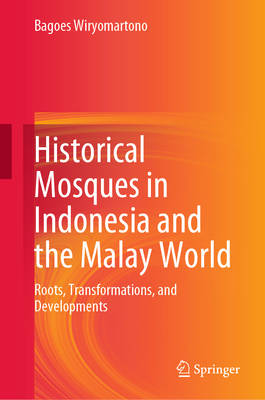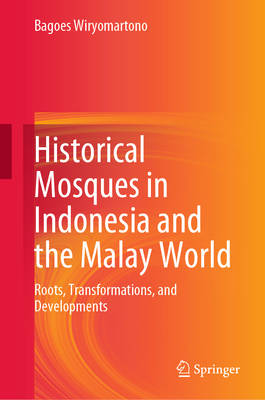
- Afhalen na 1 uur in een winkel met voorraad
- Gratis thuislevering in België vanaf € 30
- Ruim aanbod met 7 miljoen producten
- Afhalen na 1 uur in een winkel met voorraad
- Gratis thuislevering in België vanaf € 30
- Ruim aanbod met 7 miljoen producten
Historical Mosques in Indonesia and the Malay World
Roots, Transformations, and Developments
Bagoes WiryomartonoOmschrijving
The book is an interdisciplinary study on the relationship between Muslims and their mosques in Indonesia and Malaysia. It presents selected historic mosques that demonstrate local interpretations and sociocultural assimilation, as well as a geographical syncretism, of Islam in local societies. The book unveils the contestations, synchronizations, assimilations, and integrations of local and foreign elements into the contextual architecture and sociologically institutionalized system that is the mosque: the Islamic place of worship. The author excavates the mosque's historical origins and traces the iconic elements, features, and designs from their earliest historical settings and contexts. He then identifies, analyzes, and theorizes the outcomes of the interaction between Islam and local traditions through Malaysian and Indonesian case studies. The book proposes that Islam, at its philosophical level, can be culturally acceptable anywhere because it contains universal virtues of humanity for equality, fraternity, and social justice. The book unfolds how a dialectical contestation and acculturation of Dutch colonialism, Middle Eastern elements of culture, and local customs and traditions, might then come into dialogue, peacefully. Finally, the book considers the relationship between Malay and Indonesian architecture within their respective political cultures, shedding light on Islam and its practice within rich multicultural contexts. Relevant to students and researchers in Islamic studies, architecture, and Southeast Asian studies more broadly, the book uncovers the issues, constraints, and opportunities relating to the meaning of mosques for Muslims in Malaysia and Indonesia.
Specificaties
Betrokkenen
- Auteur(s):
- Uitgeverij:
Inhoud
- Aantal bladzijden:
- 124
- Taal:
- Engels
Eigenschappen
- Productcode (EAN):
- 9789819938056
- Verschijningsdatum:
- 24/07/2023
- Uitvoering:
- Hardcover
- Formaat:
- Genaaid
- Afmetingen:
- 156 mm x 234 mm
- Gewicht:
- 371 g

Alleen bij Standaard Boekhandel
Beoordelingen
We publiceren alleen reviews die voldoen aan de voorwaarden voor reviews. Bekijk onze voorwaarden voor reviews.











